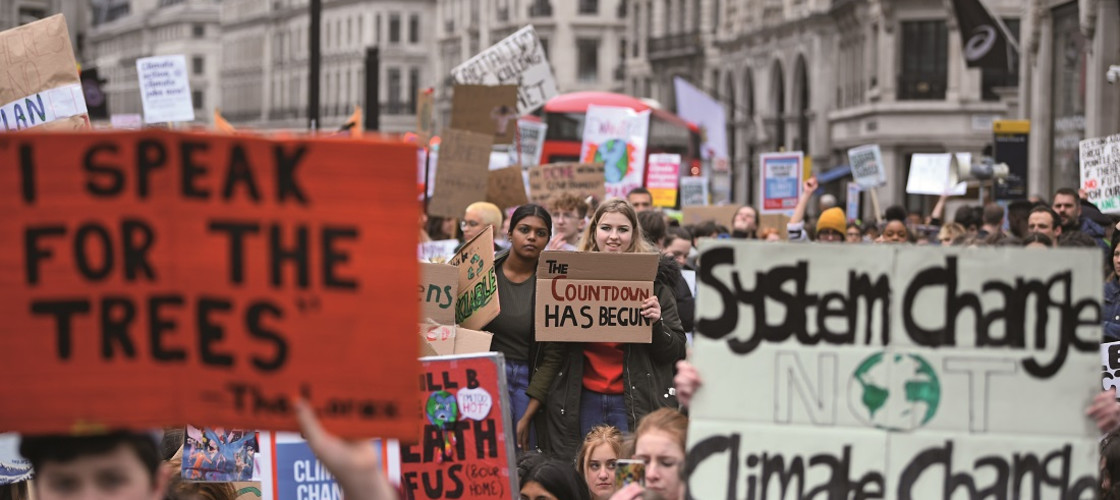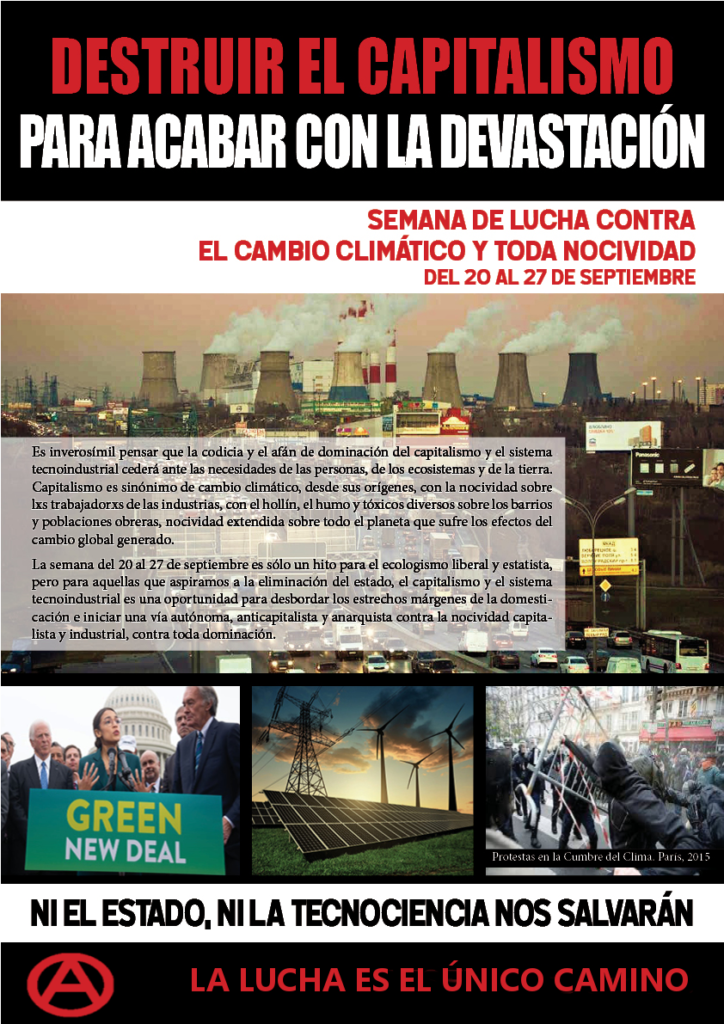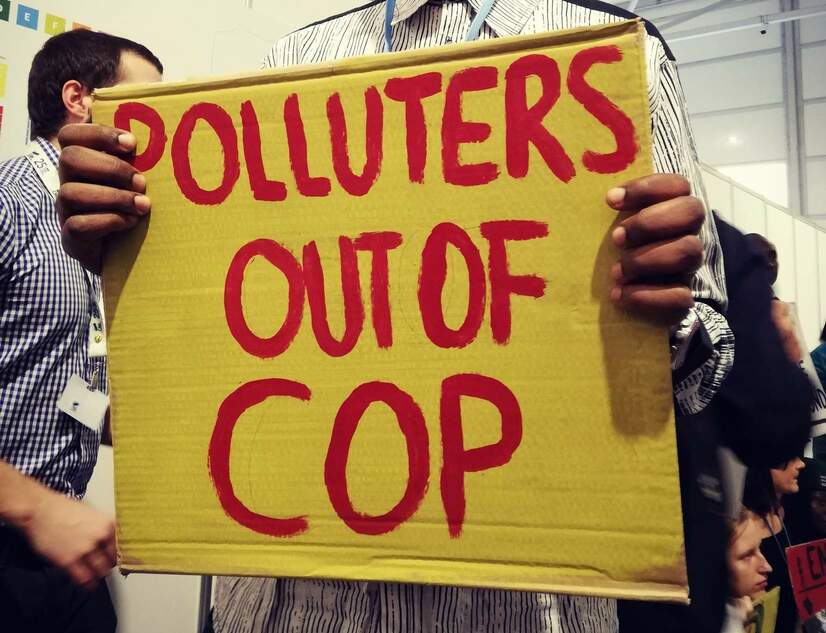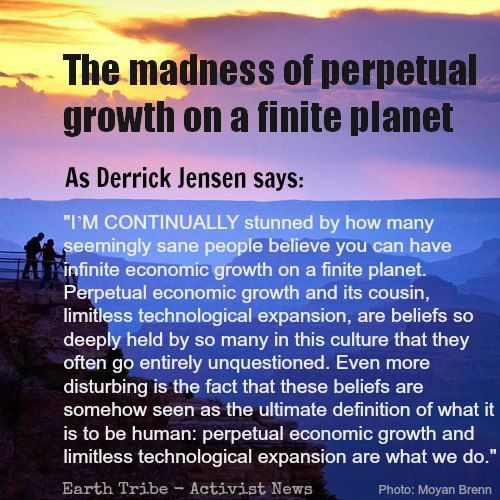Cumbre Social por el Clima – COP 25 en Madrid 6-13 december .
«Now is NOT the time to offer an escape route to polluting Northern country governments and big oil.»
by Andrea Germanos, staff writer at Common Dreams
As the United Nations climate summit COP 25 kicked off in Madrid, Spain on Monday, environmental advocacy groups warned that market-driven approaches to tackling the global emergency are an obstacle to real solutions to rein in emissions and making those most responsible for the crisis pay.
At issue are international carbon markets, which, as a DW headline put it, will «take center stage.»
Young climate activists protest carbon markets
«Big polluters must be rubbing their hands in glee that carbon market mechanisms, which further dilute the already weak and inadequate Paris emissions targets, are back on the agenda,» said Dipti Bhatnagar, Climate Justice and Energy Program coordinator for Friends of the Earth International (FOEI), in a statement.
As Nature explained Monday,
At last year’s conference, nations agreed on a set of rules for tracking and reporting greenhouse-gas emissions and for reviewing collective progress. However, they failed to establish clear rules around carbon markets through which emissions made in one country can be offset by investing in low-carbon technologies elsewhere. Although it is unclear whether negotiators will be able to reach agreement this time around, Article 6 of the Paris agreement—which aims to promote voluntary international cooperation between nations—is a central point on the agenda, and offsetting will almost certainly be discussed.
Climate groups have treated with suspicion carbon markets, whether they take the form of «cap and trade»—where one polluter can trade its surplus units of allowable carbon emissions to another polluter—or carbon offsetting—in which some activity is done to «offset» the carbon created a polluter.
In briefing paper last month, Friends of the Earth and other climate groups said that not only do carbon markets not work to adequately limit emissions, the market approaches can unleash harmful consequences for local and indigenous communities

 UN Climate COP launches in Madrid .. Activists in Chile Demand Rejection of Neoliberal Model and Removal of Chile from COP Presidency .. Chilean President Sebastian Piñera Abandons Plans to Travel to Madrid for COP2 Due to Threat of Detention for Human Rights Abuses
UN Climate COP launches in Madrid .. Activists in Chile Demand Rejection of Neoliberal Model and Removal of Chile from COP Presidency .. Chilean President Sebastian Piñera Abandons Plans to Travel to Madrid for COP2 Due to Threat of Detention for Human Rights Abuses
«Carbon markets operate on the false and unscientific assumption that offsetting emissions and selling permits to pollute will reduce global warming,» the groups said.
The briefing paper details a number of problems with the scheme, including that carbon prices are too low, the markets do nothing to remedy local impacts of fossil fuel projects, «offsetting» projects can lead to evictions of forest dwellers, and trading can allow fossil fuel companies—whose voices are uplifted over those of communities—a decade or more of time to continue planet-warming projects.

Global Justice Ecology Project and Biofuelwatch also addressed carbon markets in a statement on Monday, saying the approach was being pushed by Chile at this year’s climate conference.
The groups condemned the scheme as «commodification of the Earth» that enables «climate-destroying business as usual under the pretense of climate action.»
«The climate crisis is already devastating lives,» said FOEI’s Bhatnagar in her statement. «Emissions are still rising. Now is not the time to offer an escape route to polluting Northern country governments and big oil.»
«Carbon markets fail to deliver emissions reductions or adequate climate action and impact horrifically on Indigenous Peoples and local communities,» Bhatnagar continued. «They only serve to strengthen corporate power and impunity, deflect responsibility from rich historical polluters, and prevent urgent and equitable action on climate change.»

Speaking to reporters in Madrid Sunday, U.N. Secretary-General António Guterres laid out what’s at stake at the climate conference in stark terms.
«We are confronted now with a global climate crisis,» Guterres said. «The point of no return is no longer over the horizon. It is in sight and hurtling towards us.»
That threat drew young people to the streets on Friday for another global climate strike ahead of COP 25.
Youth climate leaders Greta Thunberg of Sweden, Luisa Neubauer of Germany, and Angela Valenzuela of Chile wrote Friday in an op-ed for Project Syndicate that «Striking is not a choice we relish; we do it because we see no other options.»

«We have watched a string of United Nations climate conferences unfold,» they continued. «Countless negotiations have produced much-hyped but ultimately empty commitments from the world’s governments—the same governments that allow fossil-fuel companies to drill for ever-more oil and gas, and burn away our futures for their profit.»

The youths’ message to those at the COP 25 «is simple: the eyes of all future generations are upon you. Act accordingly.»Our work is licensed under a Creative Commons Attribution-Share Alike 3.0 License. Feel free to republish and share widely.
xxxxxxxxxxxxxxxxxxxxxxxxxxxxxx
Deepening our resistance
shared from Acorn with thanks

…. …. Close scrutiny of XR and the climate movement as a whole suggests that all this rebellious energy is in danger of being channelled into a cunning ploy to relaunch capitalism.
The plan is to use a “Green New Deal” and a “New Deal for Nature” to spark a “Fourth Industrial Revolution” which will make a lot of people very rich, including the venture capitalists who have voiced support for XR.
Obviously the people involved on the ground in the XR London protests were not willingly part of a capitalist plot. Obviously they are not stupid and many must have been aware of the danger of their struggle being co-opted. Hopefully many of them will break free from the “leadership” and organise autonomously and radically.
But there is a major problem behind this wave of environmental protest which goes beyond the detail of the signatories of the XR Business letter to The Times or the corporate links to the climate campaigns set out with painstaking detail by investigative journalist Cory Morningstar.
The problem is with the use of the term “climate” as the cornerstone of the movement.
Green Anti-Capitalist Front – Climate Struggle Is Class Struggle https://greenanticapitalist.org The Green Anti-Capitalist Front is an alliance of groups and individuals united by a belief that capitalism is one of the core causes of the environmental crisis threatening us all, and that if we do not act soon the costs of that crisis will fall on the poor and powerless.
We are not saying that climate change is not real and dangerous but it is by no means all that is really dangerous about industrial capitalism.
What about extractivism in general, not just for fossil fuels? What about pesticides? What about nanoparticles? What about all the rest of the pollution, contamination and destruction that forms part of this nightmare industrial age?

It won’t disappear with the measures being proposed to deal with climate change. All that hi-tech carbon capture technology, all those solar panels covering the world’s deserts, all those wind turbines cluttering our coastlines, will still need to be manufactured in polluting factories, using raw materials mined out of the flesh of Mother Earth.
Fighting under the banner of “the climate” is a severe weakness for the environmental movement because it means the issue can be picked off, channelled and neutralised.
If “the climate” is the problem, then capitalism is on hand to sell us the solution.

The money-orientated approach is always about superficial responses. If you have got a cold, a drugs company will sell you a product to suppress the symptoms. But you will still have a cold and it will probably last three times as long because your body will be prevented from expelling toxins in the way it knows best.
If environmentalists place climate issues within the larger context of what our culture has become, then the capitalists can have no quick-fix solution to sell us. There is no sales opportunity for them. They cannot latch on to a movement which aims to see their empire of greed and profit taken down.

The narrow fixation with “climate” on the current environmental scene is part of a larger issue, namely that of fragmented thinking.
It is here that the relevance of organic radicalism comes in. Again and again, the thinkers who inspired this philosophy condemned the modern tendency towards fragmented thought.

The same point is made in different ways by the likes of neurologist and psychiatrist Kurt Goldstein, psychologist Max Wertheimer, philosopher Alan Watts, anti-industrialist writer Theodore Roszak and editor Satish Kumar.
Indeed Kumar has specifically mentioned “climate” in this context, saying: “I am constantly reminding people to think holistically, think in a bigger way, a spiritual way, rather than get stuck in this one idea that climate change is the problem, or this or that is the problem. Our problems are interrelated”.
He adds: “The actions of environmentalists will lead to tears if they don’t come from the place of the spirit. Their activism can end up in nuclear power or genetic engineering or the whole countryside covered with windmills or solar panels and no trees left anywhere”.
Fragmentation is a problem which goes to the heart of the failure of our civilization. We have lost sight of the holistic unity of things and see only unconnected separate items forming no coherent pattern. We don’t see a wood, just trees. There is no such thing as society, only individuals. The idea that humankind is part of nature is regarded as a naive fantasy.
On the political level, once we start fragmenting our understanding into separate issues, we cut those issues off from the whole of which they are part.
Racism and sexism, for instance, can only really be understood within a wider context of our relationship to “the other”, of complex patterns of projection, power and domination.

An organic radical perspective insists on the unity of the human species as an organic entity, and on humankind’s belonging to the living world and the cosmos beyond.
It challenges the individualism, the subjectivism, the “me first”, the “I think therefore I am”, that underpins our whole modern culture.
Fragmented thinking just talks about racism or sexism as separate issues. And, lo and behold, in isolation they can easily be “solved” (in fact, hidden from view!) by the system.
“Racism is over – here’s a black president! Sexism is over – look how many CEOs of rapacious capitalist corporations are now women!”
“You say CO2 is the problem? We have just the machine you need? Can’t afford it? You’d better declare a climate emergency and raid the public piggy bank to buy it from us!”
Organic radicalism is an attempt to counter fragmented thinking in anti-capitalist and environmental circles.
It is an attempt to give our movements real philosophical roots, to make them strong and alive.
The name given to this deeper understanding is not important, of course. It has appeared in many forms throughout history and will do so again.
Whatever we choose to call it, we badly need this ancient and powerful wisdom to guide us away from traps and dead-ends and to steer us into the free and healthy future for which we yearn.

Related Articles


Meet the Big Polluters Sponsoring COP25
Between the Devil and the Green New Deal, by Jasper Bernes in Commune magazine.
Entre le marteau et l’enclume du Green New Deal – French translation of Jasper Bernes article.
Entro o Diabo e o Green New Deal – Portuguese translation of Jasper Bernes article.
Entre la espada y el Green New Deal – Spanish translation of Jasper Bernes article.
Green New Deals – The Degrowth Perspective. Features links to some useful articles challenging “green growth”.


Big Polluters Must Be ‘Held Liable’ for Destruction of Climate, Campaigners Say at COP 25
Video. These Companies Are Making Profit From Saving The Planet. Banking Nature.
Cumbre Social por el Clima – COP 25 en Madrid 6-13 de .
Degrowth and the death of capitalism






Reblogged this on The Most Revolutionary Act and commented:
‘The plan is to use a “Green New Deal” and a “New Deal for Nature” to spark a “Fourth Industrial Revolution” which will make a lot of people very rich, including the venture capitalists who have voiced support for XR.’
Me gustaMe gusta